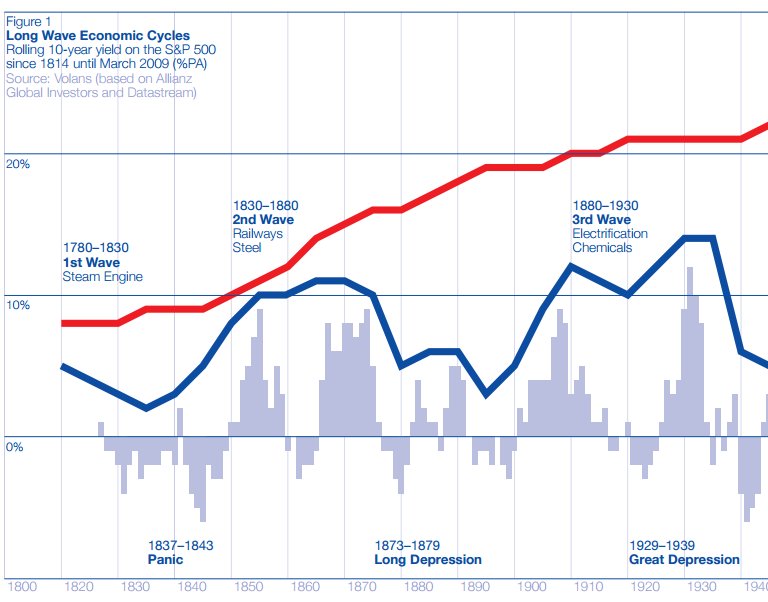|
INITIATIVES
VOLANS BREAKTHROUGH ANALYSIS
|
|
|
|
TO DO ... update images to be more relevant to the subject matter
|

|

|

|

|

|

|
VOLANS BREAKTHROUGH ANALYSIS
LONG WAVE ECONOMIC CYCLES - 1800 TO 2010
|
Long Wave Economic Cycles
Rolling 10-year yield on the S&P 500 from 1814 to March 2009 (%PA)



Source: Volans: Breakthrough Business Models Report, September 2016
|

|

|
The central themes of the Volans concepts can be summarized as follows:
(1) Think Sustainably
Leaders know that the rules of the game are about to change faster than at any time in their working lives. Simply parroting the latest sustainability jargon won’t make the cut—indeed the entire Sustainability Industry must undergo a radical reinvention, involving defragmentation and re-capitalization, if it is to tackle its current weaknesses, including intense siloing, internal competition and a Babel-like confusion of terminologies.
(2) Think Exponential
As leaders learn to Think Sustainably, they will also need to learn to Think X, shorthand for Think Exponential. In the same way they once looked to activists and social entrepreneurs for evidence of where markets were headed, they must now engage a very different set of players. These new players are not happy with 1% or even 10% year-onyear improvements, instead pushing towards 10X—or 10-fold—improvements over time. And in Thinking X, business leaders need to think of four key domains where the X agenda is already playing out.
(3) Think Social
The first imperative is to Think Social. This is not simply about embracing social media and networks, but positioning business for a world pushing from 7 billion to 10 billion people within a
few short decades. This builds on the work of social entrepreneurs and intrapreneurs, and impact investors, moving us all into areas like behavioral and cultural change.
(4) Think Lean
The second imperative is to Think Lean. The triple bottom line agenda—now also embraced by the burgeoning global B-Corp movement—expanded the focus from eco-efficiency to new forms of value
creation—and destruction. Now there is a need to pull together movements working on lean production, lean startups and frugal innovation, and those aiming to create new forms of efficiency across all major capitals (e.g. physical, financial, human, intellectual, social and natural capital).
(5) Think Integrated
The third imperative is to Think Integrated. There is growing interest in Integrated Reporting, with sustainability accounting and disclosures converging with financial accounting and disclosures. But integrated accounting and reporting across multiple forms of capital is only part of the challenge. To break through, we need to evolve solutions that are integrated across—and impact—every level of the system. In tomorrow’s capitalism, this will mean seamless data flows from farms, fisheries and factories right out to the biosphere, oceans and atmosphere. The result: new forms of market intelligence that most business leaders do not yet know that they will soon find indispensable.
(6) Think Circular
The fourth imperative is to Think Circular. Going—or thinking—in circles used to be seen as a bad thing, but now concepts like the Circular Economy and Cradle-to-Cradle Design are gaining real traction. This aspect of the Sustainability X agenda runs directly counter to the linear take-make-waste model of capitalism, but the accelerating push towards a low carbon economy—with the new emphasis on carbon productivity—will catalyze closed-loop value webs and business models
|
TPB/TVM observation:
The difference between the Volans approach and TVM is that TVM starts with what actually exists and looks to measuring progress and performance of what exists from every perspective. Based on measurement and reporting, it then becomes more efficient to implement initiatives to improve progress and performance. It should also be noted that measurement using the TVIA approach does not in any way depend on the way initiatives have been designed and are being implemented. Good measurments of progress and performance are agnostic with respect to the design of the initiatives.
|
|
|
|

